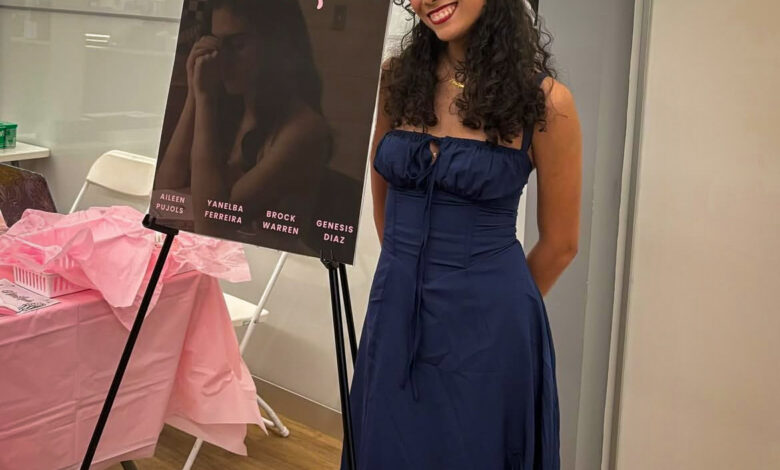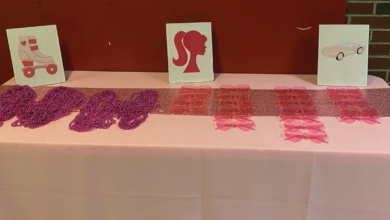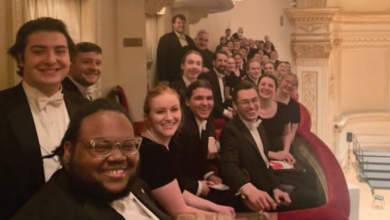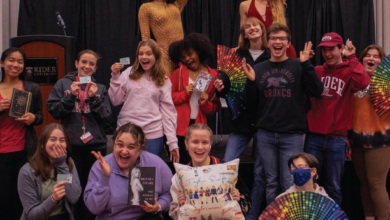
Senior Spotlight: Aileen Pujols, forging her own path
By Kaitlyn Seawood
AILEEN Pujols never planned to be a filmmaker or an actor — at least, not at first.
“I really wanted to be Barbie,” she said with a laugh. “I wanted every single job in the world, but I realized that that wasn’t possible. So I was like, oh, maybe acting. … You really can have every single job in the world.”
The Dominican-American senior acting major is not only preparing to graduate, she is leaving behind a legacy of storytelling that is deeply personal, unapologetically Latina and powerfully vulnerable.
Pujols’ latest project, “Niña Linda,” is a short film she wrote and starred in, presented in Spanish with subtitles. The film explores a young girl’s journey through faith, sexuality and identity within the confines of purity culture, inspired by Pujols’ experience growing up in an immigrant, low-income neighborhood in West New York, New Jersey.
“The fact that we even had an acting program in high school was a privilege,” she said. “That’s not something that you see in neighborhoods like mine.”
Pujols recalled a moment at the Pentecostal church as a child when a boy pointed out the scar on her right hand and grabbed it. The attention left her feeling deep shame, marking the start of her awareness of how society often hypersexualizes young girls of color — even in sacred spaces.
This moment of discomfort and self-awareness became a key inspiration for “Niña Linda,” a film that explores these complex dynamics.
To bring “Niña Linda” to life, Pujols reached out to Ashley Morales, a fellow Latina creative who graduated from Rider in December 2024 with degrees in film and English. Morales directed the film and connected deeply with the script and Pujols’ story.
“It just was an opportunity that I couldn’t say no to,” Morales said. “I hadn’t seen that many female directors or Latin American directors. So it was just a great opportunity.”
“Niña Linda” received recognition at film festivals like the East Village New York Film Festival and the Count Basie Center Breakthrough Filmmaker Fest.
Morales described the experience as humbling and meaningful, especially from a background where creative work often goes unrecognized.
Though “Niña Linda” is in Spanish, Pujols urges all audiences to look beyond the language.
“A certain demographic might not see themselves represented,” she said. “I don’t think that that’s something that should bar you from engaging in the film … because ultimately, it is a story about a young girl navigating her own life.”
Despite her quiet confidence, Pujols has often stood alone. She explained that, as of last semester, there were only two people of color in the program; the other person graduated early.
“Now I’m the only woman of color in my graduating class, which is crazy,” she said.
Her presence and voice have not gone unnoticed by others, particularly Leandra Acosta ’19, associate director of performance management and box office manager. Acosta has mentored Pujols since her first day at Rider when Pujols was her first student worker.
Acosta recalled Pujols’ first interview vividly, describing her as soft-spoken and eager to say the “right” thing, with air quotes.
Acosta noted the tenacity it took for Pujols to bring “Niña Linda” to life when securing funds and advocating for the importance of her story.
“She had to go out there and say, ‘Hey, I’m this student. I’m trying to put together this work, and here’s why it’s important,’” she said.
Acosta said mentoring students like Pujols is humbling when witnessing the realities students face after leaving the safety net of college.
“As an independent artist coming out of your collegiate experience, I won’t necessarily say that you’re set up for failure,” Acosta said. “Sometimes the college experience sets you up for a sense of safety … then getting out into the field and actually doing the work is a little bit different.”
Still, Acosta believes that students like Pujols pave the way for others — especially students of color in predominantly white creative spaces.
Through tight budgets, long days and the weight of forging her own path, Pujols said one of the most meaningful outcomes of her journey has been her family’s growing support.
Although it was hard for her family to understand the concept of their daughter “playing dress-up” and not having a traditional job, Pujols recalled when they realized she was serious about her career.
“They saw me waking up at four or five in the morning, taking the train [to Rider] to film … I think that really made a difference. It showed them how much this means to me.”
Drawing inspiration from poet and novelist Elizabeth Acevedo, Pujols dreams of one day auditioning for the upcoming screen adaptation of “Clap When You Land.” She also credits Greta Gerwig’s “Barbie” as a film that changed her life.
As Pujols reflects on the stories she tells on stage, on screen and on the page, she hopes her work creates a lasting impact, especially for young Latinas navigating similar spaces. She grew teary-eyed describing how students have approached her, saying her work makes them feel seen and supported.
Despite the vulnerability it takes to put her experiences into the world, that response reminds her why she does it. As she puts it, “That’s all I’ve ever wanted — for people to feel less alone.”



